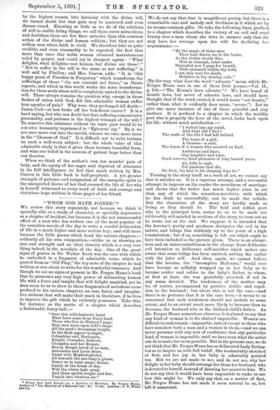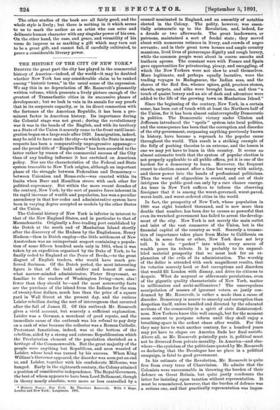" WHOM GOD HATH JOINED."*
WE review this story separately, not because we think it specially able as a study of character, or specially impressive as a chapter of incident, but because it is the not unsuccessful effort of a man who has written one of the most popular of the sensation-novels of the day to write a careful delineation of life in a much higher and more serious key; and still more
because the little poems which head the various chapters,— evidently all his own composition,—strike us as showing an ease and strength and an ideal vivacity which is a very rare thing indeed in the novelists of the day. One of the great signs of genius in Sir Walter Scott was the ease with which he embodied in a fragment of admirable verse, which he quoted from as " Old Play," the key-note of the chapter he had written or was about to write for his wonderful romances. And though we see no signs at present in Mr. Fergus Hume's book that he possesses any very high power of delineating human life with a force and insight that will delight mankind, yet he does seem to us to show in these fragments of melodious verse prefixed to his various chapters, an ease, fancy, and imagina- tive airiness that will make their mark in literature, if he lives to improve the gift which he evidently possesses. Take this,
for instance, as the motto of a chapter which describes a.fashionable fancy-ball :— " Sure this wild fantastic band Must have come from Fairy-land.
Those who live in History's page, Step once more upon Life's stage. All the poet's dreamings bright, In the flesh appear to-night, Columbine and Harlequin, Knight, Crusader, Saracen, Cleopatra and her Roman, Herod, Borgia. loved of no man, Antoinette and Louis Seize, Faust with Mephistopheles, All beneath the gas-lamp's gleam, Dance as in some magic dream. Surely at the break of day, Will the vision fade away, And these spirits bright and fair, Vanish into viewless air."
• Whom God bath Joined; or, a Question of Marriage. By Fergus Hume, Author of " The Mystery of a Hansom-Cab," dm. 3 vols. London : F. V. White and Co.
.We do not say that that is• magnificent poetry, but there is a remarkable ease and melody and liveliness in it which are by no means common gifts. Or take the following lines, prefixed to a chapter which describes the victory of an evil and cruel beauty over a man whom she tries to ensnare only that she may have her revenge upon his wife for declining her acquaintance :-
" By the magic of thine eyes
Thou bast drawn me to the brake, As thy victim slowly dies, Hiss in triumph, cruel snake. Strangled now I gasp for breath, Thus ensnared within thy toils, I can only wait for death, Helpless in thy shining coils."
(By-the-way, what does the word " adrastic " mean, which Mr.
Fergus Hume uses in one of these little poems,--Vol. II.,
p. 108,—" The Koran's laws adrastic" ? We have heard of drastic laws, but never of adrastic laws, and should have thought that if the word existed, it would mean "not drastic," rather than, what it evidently does mean, " severe.") Let us
give one more instance of one of these graceful and airy mottoes. It is prefixed to a chapter in which the worldly poet who is properly the hero of the novel, looks back upon his life, without much satisfaction :—
" I looked into my mind,
And what did I find ?
The waifs of the life I had left behind.
The tears of a girl,
A blossom—a curl, The heart of a woman who married an Earl.
Ambitions and fears, Gay laughter and tears, Dead sorrows, dead pleasures of long buried years.
Ah, folly to sigh, For passions that die, Sir Poet, 'tis best to let sleeping dogs lie."
Turning to the story itself as a work of art, we cannot say
that it satisfies us. It is a vigorous attempt, and a successful attempt, to impress on the reader the sacredness of marriage, and shows that the writer has much higher aims in art than any of which the sensation-novelette, with which
he has dealt so successfully, can be made the vehicle. But the characters of the story are hardly made as living as they should be. The bold and selfish poet who is the principal hero, seems to us to be made too deliberately evil-minded in sections of the story, to turn out as
he turns out at the end. We suppose it is intended that the heroine's purity and goodness dissipates the evil in his nature, and brings him suddenly up to the point of a high renunciation ; but if so, something is left out which ought to have been included in the picture given. There is an abrupt- ness and an unaccountableness in the change from deliberate
evil intention to deliberate self-sacrifice which makes one aware that some bridge has been omitted, uniting the earlier with the later self. And then, again, we cannot believe that the heroine, the "incomplete Madonna," would ever
have become so selfishly wrapped up in her baby as to
become colder and colder to the baby's father, to whom, at first at least, she was gratefully attached, if not in any sense devoted. The tenderness of the mother may be, of course, accompanied by positive dislike and repul- sion to the husband ; but where this is not the case,--and there is no pretence that it is the case here, it seems to us unnatural that such tenderness should not include to some extent, and to an extent much more likely to increase than to decrease, the husband who is the idolised child's father. As Mr. Fergus Hume somewhere observes, it is absurd to say that any kind of woman is in the abstract impossible. Women are difficult to understand,—impossible, indeed except to those who have somehow both a man and a woman in them,—and we can never presume with any sort of confidence that any particular
kind of woman is impossible until we have seen what the artist can do to make her seem possible. But in the present case, we do
not think that Mr. Fergus Hume has so delineated Lady Erring- ton as to inspire us with full belief. She is admirably sketched at first, and her joy in her baby is admirably painted too. But we are not made to see, and do not see, why her delight in her baby should estrange her from her husband, who is devoted to herself, instead of drawing her nearer to him. We do not say that it would have been impossible to make us see how this might be. We only say that, as a matter of fact, Mr. Fergus Hume has not made it seem natural to us, but
left it unnatural. The other studies of the book are all fairly good, and the whole style is lively; but there is nothing in it which seems to us to mark the author as an artist who can seize and delineate human character with any singular power of his own. On the other hand, the ease, and grace, and versatility of his Terse do impress us as marking a gift which may turn out to be a great gift, and cannot fail, if carefully cultivated, to prove a considerable literary power.



































 Previous page
Previous page